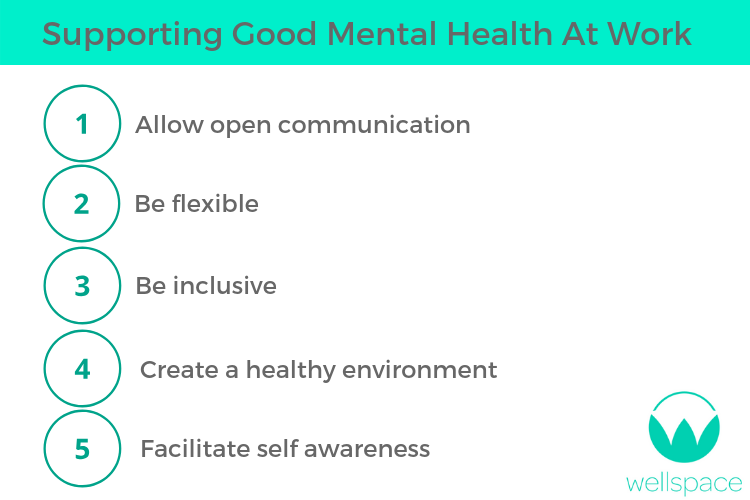It is proven that supporting good mental health at work can help improve productivity, reduce turnover, aid recruitment, and improve colleague relationships.
In this article we will look at five practical ways you can support good mental health in your workplace.
Of course, some mental health problems, such as Autism, ADHD, and OCD, can impact the suffers’ life to the point where they are classed as having a disability, and it isn’t hard to see why.
That’s not to say that other mental health issues, such as stress, depression, and anxiety are any less debilitating and impactful.
As an employer, there is a legal and moral obligation to safeguard the wellbeing of your staff and make reasonable adjustments for disabilities.
But supporting good mental health at work is about more than that. It is about working with staff to reduce the likelihood of mental health issues occurring, or to mitigate the effects when they do occur can feel overwhelming.
Where do you start? What is crossing the professional line? How can you affect someone’s happiness?
In reality, supporting good mental health at work isn’t as hard as it might sound.
Here are some simple steps you can take to ensure everyone has access to good mental health at work.
Top 5 Tips for Supporting Good Mental Health at Work
1) Allow open communication
2) Be flexible
3) Be inclusive
4) Create a healthy environment
5) Facilitate self awareness
1) Allow Open Communication
Professionalism is important. It sets boundaries, prevents misunderstandings and misconduct and ensures the world sees your business in the correct light. But it can sometimes get in the way of being approachable.
It is vital that colleagues feel able to voice concerns without fear of recrimination or punishments.
Casually checking in with colleagues can be a great way of demonstrating openness and compassion. A simple ‘how are you feeling today?’ can make all the difference.
Additionally, you could give staff the opportunity to have any issues or concerns noted during appraisals.
Not having to suffer in silence can help staff a great deal.
2) Be Flexible
Some people can feel fine one minute and overwhelmed, stressed or out of sorts the next. Supporting good mental health at work will require some flexibility from the company.
Be aware that changes to workloads, rotas and meetings may have to be made last minute. In the long run, the colleague will be happier, more productive, and have fewer absences.
3) Be Inclusive
This is especially important if your colleague is absent or not very extroverted.
If your team socialises together, don’t neglect to invite them each time, even if they always decline. It can be hard to socialise when suffering with poor mental health, but it is still nice to feel included and part of a team.
If you are the sort of company who sends birthday cards, newsletters, or bulletins round, don’t forget to send them to colleagues who might be off sick. It will remind them that they are still a part of the company.
4) Create a Healthy Environment
If you are committed to supporting good mental health at work a good place to start is by examining the work environment.
Studies have proven that the environment in which one works every day can impact on one’s mental health. Natural light, plant life, bright colours, and images of smiling faces can all subtlety improve a person’s mental wellbeing over time.
Consider how you could let as much natural light in as possible. Maybe the blinds are always drawn because the sun glares off computers. Investing in some screen covers designed to reduce glare will mean the light can flood the office.
Plants have a demonstrable effect on the mental wellbeing of people. You can pick up potted plants fairly cheaply and place them around the office. Just don’t forget to water them.
5) Facilitate Self Awareness
When we are feeling stressed or low it can be very easy to get bogged down in the thought that every day is a grind without really stopping to consider if there are any external factors influencing our emotions, such as sleep quality, nutrition, or external stressors.
Wellspace, our revolutionary wellness app, can help staff feel more mindful of their own emotions and triggers by recording their daily mood, sleep quality, exercise, and nutrition data.
Seeing patterns in their wellbeing activity can be the first step towards making positive changes in their life that will promote overall wellness and good mental health.
What’s more, by being able to see the data on our aggregated portal, you will know if the steps you are taking to support good mental health at work are having a measurable impact.
Wellspace are Corporate Wellness Experts
If you are considering your overall corporate wellness programme, you might be wondering how you can demonstrate the effectiveness of your activity and what you can do to complement it.
Here at Wellspace we utilise user data gathered via the wellness app to create a well-rounded corporate wellness programme that neatly dovetails into your current activities.
By driving your activities with data, you know where to focus your attention, and the impact of it.
We would be happy to talk you through some options and help you make meaningful changes for good mental health in the workplace.
Get in touch with us by filling in our contact form, email us on info@yourwellspace.com or call 0800 178 0748.










